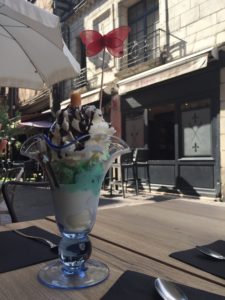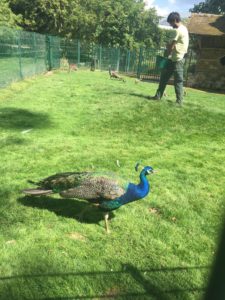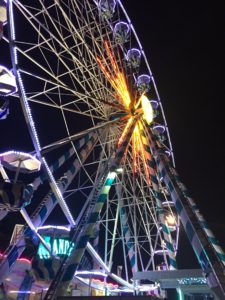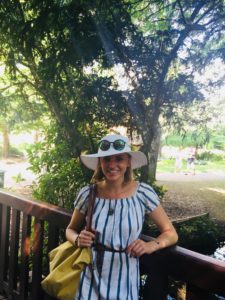A review of my third week in tours, france
“Grown-ups never understand anything for themselves, and it is tiresome for children to be always and forever explaining things to them.” – Antoine de Saint-Exupéry, Le Petit Prince // The Little Prince

“OK, c’est à toi,” Noa indicated that it was my turn to roll the die and move my little, plastic horse along the perimeter of the board. Noa is the 5 year-old grandson of Chantal, my host mom, and he was instructing me on how to play one of his favorite jeux de société (board games), Les Petits chevaux (the little horses). First you have to roll a six, then, starting from right outside your stable, you make your way around the spaces until you get back to your stable which consists of six places. To get to the first spot marked with a “1”, you first have to roll a one, then to advance you roll a two to get to the next spot, and it continues until you’ve gotten past all six spaces. To win, you have to once again roll a six, then you can proudly install your tired, little horse in the middle of the board… and start all over with a second horse. It’s not difficult to play, but as you can imagine, it can become tedious, especially if your opponent passes you up forcing you to restart all the way at the beginning.
Noa did his best to stay patient with me. He liked that I could speak English and he would exclaim “Yes!” or “What??” every once in a while (which he learned from French “Dora”), but beyond that I was just an American, blonde grown-up with French abilities not quite as good as his own and whom he’d only known for a little bit. As I was slightly distracted by a conversation with Chantal and the French news stations playing in the background, he had to remind me frequently to take my turn or re-roll the dice. Additionally, he made sure I was facing my game piece in the right direction, because I was a jockey who had a tendency to point my horse’s nose backwards and, according to Noa, “he has to go this way, you can’t go the other way!” I had a lot to learn about the rules of the race from this young professional.
We played a few other games, too, like a card-matching game and a game Noa invented which consisted of taking the dried-up moche fleurs (ugly flowers) from Mamie Chantal’s flower pots and throwing them over the side of the balcony (with her permission and adult supervision, of course). People would pass by to enter the apartment and he would warn them, “Attention ! Je jette des fleurs ! Watch out, I’m throwing flowers!” and he would then watch the petals spiral down through the air and fall into the street, sometimes successfully managing to drop them into a puddle. As with Les Petits chevaux, Noa was also a master of the matching game where he won every time except once when we tied. Each time he found a set of cards, he announced, “Mamie, look! I found another one! Je suis un beau gosse !” which made her giggle because essentially, as she explained later, what he was saying was, “I’m a stud!”

I learned some more “popular language” from Noa’s remarks during these games. Being so young, he didn’t understand what he was saying, but I knew some of it had a more mature meaning when Chantal or his father would correct him and ask with a shocked expression, “Where on earth did you learn that?” I’m finding that it wasn’t just my siblings and I that picked up the particular phrases from the TV or the street that confounded our parents: this method of language acquisition seems to be universal.

Another means of education in both the States and France is to visit animals at the zoo. This was one of my first “classrooms” where I learned about the various animals from around the world. In the same way, when I visited the botanical garden in Tours (which is much smaller than a zoo), I learned about the animals and plant life from the plaques throughout the garden and by asking questions. From there, I relearned the name of the paon (peacock) and the poule (chicken) and discovered the origins of the émeu (emu) and wallaby. It seemed a little bizarre at 21 to be figuring this out again. This sentiment applies to just about everything I’m learning in France: I have to learn like a child.
While I’m definitely more comfortable listening to and speaking French since my arrival, I have yet to perfect my interactions with the French. When I approach a native French-speaker and ask them about something basic to the French culture, at first I get a puzzled look (I’m not sure if it’s because my pronunciation isn’t perfect, or they are just surprised I don’t know the answer for myself), then once I clarify that I’m American and I study at the Institut de Touraine, I get one of two responses. The first is more positive and usually includes a story about how the person has visited America, loves American TV (the show “Friends” is really popular in France), or is interested in learning more English. The other is not quite as receptive. It entails either a political discussion asking where I stand with the current President (because in France, politics are always fair game), or being generally closed off because I’m not French. This happens much less frequently.
After asking around for some general stereotypes of Americans to see what may have provoked these more negative responses, I discovered Americans are frequently perceived as obnoxiously loud people who smile too much, are selfish (especially in wanting everyone else to speak English), and then political tensions get tossed on top of all of it just for fun. I’ll confess to talking loudly in public, being very smiley for no particular reason, and, when I first came to France, I would quickly switch to English in hopes that the person I was talking with spoke my maternal language. Since I’ve spent about 7 years now studying French and I’m still not completely confident in my speaking and listening abilities, I’ve learned it’s unrealistic to hope everyone else who isn’t native to an anglophone country is fluent in English. Learning another language is extremely difficult, which is something I had taken for granted before coming to France.

In other news, I’ve since passed the DELF B2 proficiency exam and received my level B2 diplome (certificate)! I still have a lot of work to do in French, so I’ll just keep learning like a kid and enjoying the few weeks I have left!
À bientôt ! // See you soon!
